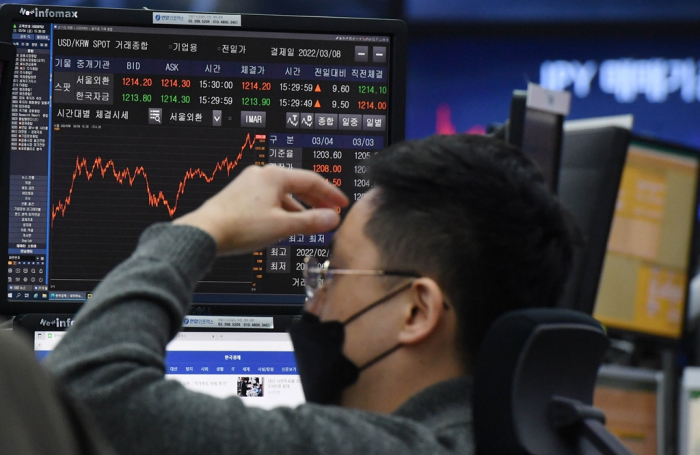
A currency trader at Hana Bank headquarters' dealing room in Myeong-dong, Seoul Dividend payments of foreign companies operating in South Korea nearly doubled and their repatriation to their headquarters is expected to hurt the country’s current account and already battered won currency.The payments of the 10 largest foreign companies by dividends for the 2021 fiscal year totaled 1.2 trillion won ($950 million), up 85.3% from 632.1 billion won a year earlier, according to filings to the Financial Supervisory Service.“A jump in profit in 2021 jumped on-year on the base effect due to the COVID-19, resulting in higher dividend payments,” said a foreign company source.BASF SE’s subsidiary in South Korea paid 291.1 billion won, the largest dividends among them, followed by Credit Suisse and JPMorgan with 165 billion won and 159.5 billion won, respectively.Those 10 global companies, unlisted firms wholly owned by foreign investors, earned a total of 1.3 trillion won in net profit last year, suggesting they are set to repatriate 88.8% of the profit to their homes rather than investing in the country. They paid a combined 453.9 billion in corporate taxes last year.Some of them paid more dividends than net profits with Credit Suisse’s dividend payout ratio at 134.6%. Volvo Group’s unit spent 122.4% of net profit on dividends, while subsidiaries of Porsche and Mercedes Benz paid 104.9% of their profits for dividends, respectively.CURRENT ACCOUNT, WONSuch higher dividend payments are expected to hurt South Korea’s current account, especially in April when foreign companies often repatriate the distribution of profits. The account reported a deficit in the month of 2019 and 2020 due to the repatriation, although a strong trade surplus helped the account post surplus in April 2021.But the current account is likely to turn to the red again this month as the country already reported a trade deficit of $3.5 billion in the first 10 days of April.That could hurt South Korea’s credit ratings and weigh on investor sentiment among foreigners as the current account is one of the key indicators of the fundamentals of Asia’s fourth-largest economy. The South Korean won is likely to weaken further, eventually, analysts said.“The dollar’s strength (against the won) may intensify on the greenback’s demand for dividend repatriation of those foreign companies in addition to the Fed’s tighter monetary policy,” said Kim Seung-hyuk, an analyst at NH Futures, referring to the US Federal Reserve.The won has lost about 3.7% against the dollar so far this year, becoming the second-worst performing currency among emerging Asian units, according to Reuters.By Ik-Hwan Kimlovepen@hankyung.comJongwoo Cheon edited this article.
Most Read